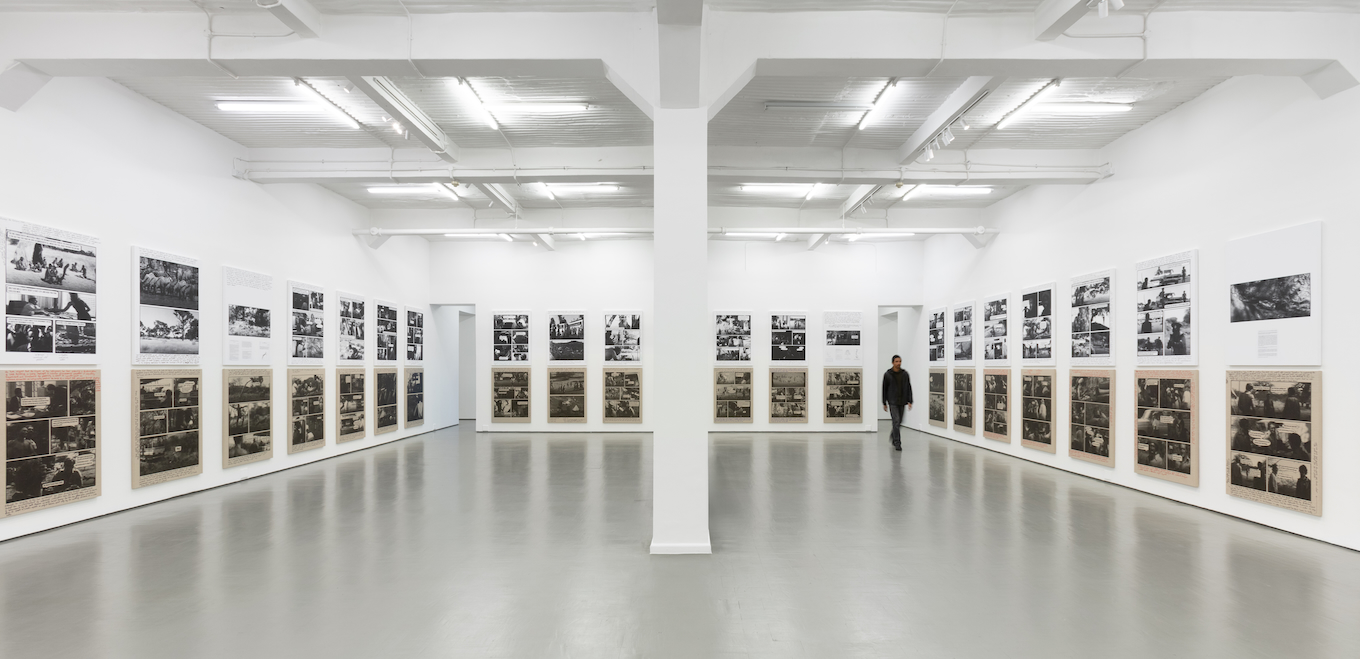Cape Town
28 June - 16 August 2025Meleko Mokgosi
Appellations

Meleko Mokgosi, Appellations, 2025, installation view
STEVENSON is proud to present Appellations and Speculations on Drawing by Meleko Mokgosi, taking place across our Cape Town and Johannesburg spaces, jointly marking his third exhibition with the gallery.
Where Mokgosi’s previous exhibitions in these cities formed part of Democratic Intuition (2013-19), an eight-chapter project examining the ways in which democracy is conceptualised, constituted and experienced within southern Africa, the works in Appellations and Speculations on Drawing chiefly derive from Spaces of Subjection, his current multi-chapter tableau. The spaces explored in this body of work span the physical, discursive and otherworldly; his concept of subjection encompasses facets of self-making including subjectivity, subjecthood and subjugation. Referencing Michel Foucault’s theories, this series advances Mokgosi’s argument that ‘subjection is a structural necessity for becoming’.
In an interview with Felicia Mings, on the occasion of Spaces of Subjection: Imaging Imaginations, his 2023 exhibition at the Art Gallery of York University in Toronto, Mokgosi expands on this framework:
In 2020, I started to think about the ways in which space had played a key role in previous work, but I did not want to confine this to just figuration. As a result I started to think about space more abstractly to include things like physical space, architectural space, psychic space/reality, history as a discursive space, as well as spaces of the human and non-human, ancestors, spiritual spaces and so on. And from there I built the project around the relationship between space and structure, and in particular, subjection as a structural proposition of becoming. The idea of subjection comes from Michel Foucault, who conceptualized it between 1981 and 1982. In writing about the formation of the human subject and its relationship to structures of power, Foucault had previously used terms that were closely aligned with subjugation. Subjection, however, refines the relationship between the human and structural mechanisms by insisting on the process of how we become human by being subordinated by power.
In Appellations, the spaces depicted include schools, homes, photographic studios and sites of labour. Within his characteristic figurative style - which engages the conventions of history painting - Mokgosi offers material subversion, presenting large-scale paintings rendered with image transfer, charcoal on canvas and pastel on paper.
Spaces of Subjection: Appellations, the 50-panel painting central to the exhibition in Cape Town, uses image transfer and permanent marker on linen. The works debuted as part of The Future Is Present, The Harbinger Is Home, the 2024 edition of New Orleans’ Prospect triennial. Developed over five years, the work focuses on The Gods Must Be Crazy, the controversial 1980 comedic film. Written, directed and edited by South African filmmaker Jamie Uys, it was shot in Botswana and Namibia, which was under South African administration at the time. The narrative follows a San man’s quest to the end of the Earth to return a discarded Coca-Cola bottle he believes is the property of the Gods; it became the highest grossing film of that time, spinning off into four sequels.
The paintings employ a look-book format reminiscent of the photo-comics that featured Lance Spearman. Each panel is annotated with commentary by the artist, drawing attention to the film’s falsehoods and racist stereotypes. Simultaneously specific and expansive, the work presents a reflexive view of the complexities of indigeneity and the politics of representation, unravelling the interlocking systems of power that overdetermine each.
The Gardener in the Artist, similarly constituted of multiple panels, elucidates the complexities of representation further. The work focuses on The Artist in the Garden: The Quest for Moses Tladi, written by Angela Read Lloyd in 2009. Lloyd undertook the biographical project after her return to South Africa in the 1970s, having grown up around Moses Tladi, who worked as her grandfather’s gardener in the 1920s. The interplay of scripto-visual material in this painting combines annotated text and photographs from Read Lloyd’s book with sketches of medicinal plants from southern Africa and regional birds. Here, the evocation of the gardener in the artist vivifies the milieu of labour and dispossession that underpinned Tladi’s life, while foregrounding his cultivator’s subjectivity, which prized growth and nurture within its subjection.
The exhibition takes place concurrently with Speculations on Drawing, a presentation that examines drawing as process, concept, and a theoretical framework, in Johannesburg.
The exhibition opens Saturday 28 June, 10am to 1pm.

